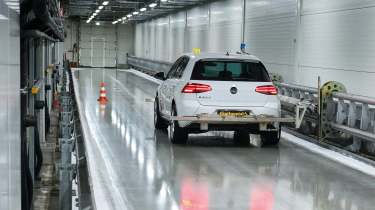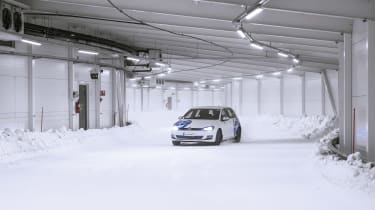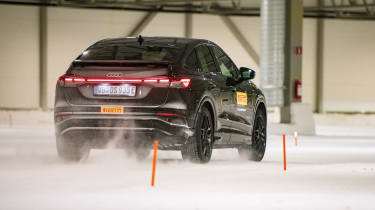Indoor tyre testing facilities: behind the scenes
Increasingly, tyre manufacturers are heading indoors to speed up development. We take a look at the facilities they use
The door-sized roller shutter raises double quick, as if impatient, and I step through. Snow crunches beneath my feet, the chill hits my face and I grin. I’m standing in a space about the size of a decent supermarket, its surface carpeted in snow. Nearby are a couple of cars and I can see a circuit marked out around the perimeter with thin orange poles. It’s -10deg C in here. The crazy thing is that just a few minutes earlier I was outside, gently baking in 20-degree June sunshine.
We are in northern Sweden, close to the Arctic Circle, at a test facility owned by a company called Arctic Falls. The northern reaches of Scandinavia are the go-to winter-testing destination for European tyre makers and car manufacturers. In 2017 Pirelli opened its own, extensive, 130-hectare proving ground just down the road at Flurheden, but it has helped in the creation of this indoor facility by committing to a certain amount of annual usage.
> An unlikely wind tunnel facility in Northamptonshire – Catesby Tunnel
Increasingly, tyre manufacturers are heading indoors in efforts to speed up development, and the key reason is the consistency offered by a controlled environment. The winter test season in Scandinavia runs from November to March, sometimes April, yet even this far north large temperature fluctuations are possible in a single day. As spring approaches, sunshine can play havoc with ice test surfaces; graded snow can maintain its condition but the surface of ice can melt very rapidly, halting testing. The stability of indoor test tracks can help accelerate development.
At the Arctic Falls facility there are 400m-long ice and snow lanes that can be connected to the indoor ‘flex’ space. These allow development to continue during the summer months, which is especially useful in the development of ‘all-season’ tyres. Pirelli’s test track has summer test tracks too, so comparison of an all-season tyre’s performance in all relevant conditions – snow and ice, warm and cold wet and warm and cold dry – is possible in mid-summer in pretty much the same location on the same day.
The flexible space at Arctic Falls can be configured as required and adds the ability to assess cornering performance. Initially the space was filled with snow from outside but it’s been discovered that the snow makers installed in the roof deliver a more consistent surface. Driving around is an odd sensation, like being in a two-dimensional snow dome. Speeds of up to around 50mph are possible, allowing some useful assessment of traction and stability control interventions, and braking and accelerating while turning. It’s odd to see a piste basher parked up but it was even more odd at one point to realise that it was snowing indoors. The space can be kept at -10deg C even when it’s up to 24deg C outside.
Such a space can be useful to car makers, though it doesn’t offer enough challenges for complete vehicle sign-off because that requires gradients and higher-speed handling. In time a solution to this may come because the consequences of a European car maker not completing sign-off before spring arrives are expensive: either delay the programme and wait another year, or ship cars and engineers to New Zealand. Even if a car maker commits budget and resource to the latter, there’s an inconsistency to cope with: snow in the southern hemisphere is slightly different…
The first indoor snow handling facility opened in Ivalo, Finland, in 2019 and offers similar testing opportunities to Arctic Falls despite being different in concept. It is run by UTAC, the company that now owns and runs the Millbrook Proving Ground near Bedford in the UK. It’s a 350m long, kidney-shaped, fixed loop built in a 9m-wide tunnel.
One of the first indoor test facilities was created by Continental to test the most significant aspect of tyre performance: wet braking. It opened its Automated Indoor Braking Analyzer (AIBA) in 2012 at its main site in Hannover, Germany. Inside this 300m-long hall, conditions can be created for wet, dry and even icy braking tests, and the tests are carried out using fully automated, driverless cars that can be accelerated up to 70mph and braked, consistently. The actual braking surface can even be changed, with one huge slab of road being swapped for another hydraulically, like a child’s sliding-square puzzle.
The AIBA can carry out up to 100,000, highly accurate brake tests per year, but the process of tyre development is far from becoming automated. Continental is planning to build a second, identical wet-handling circuit at Hannover, not to test even more tyres but simply to ease the pressure on the heavily used current track – another indication that when it comes to providing predictable, consistent test conditions, indoor tracks are becoming increasingly valuable.
This story was first featured in evo issue 302.





